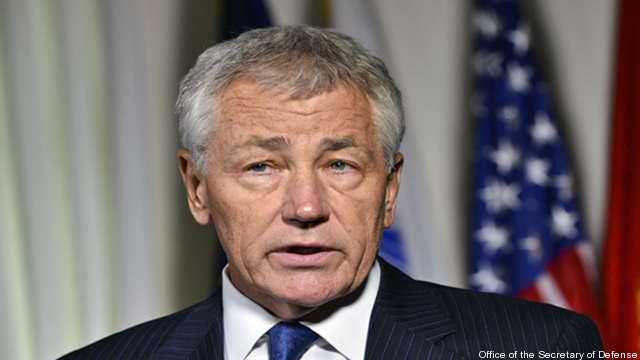Sec. Chuck Hagel Lays Groundwork For Cooperation With China, Reducing Military Pay & Benefits Growth
Posted on
 WASHINGTON: In his first major address as Secretary of Defense, former Senator Chuck Hagel paid homage to the usual pieties — but he also, very cautiously, laid the groundwork for two unpopular policies: seeking greater cooperation with China, including controversial “mil-to-mil” exchanges of military officers; and controlling the costs of pay and benefits for military personnel, the proverbial third rail of defense spending debates.
WASHINGTON: In his first major address as Secretary of Defense, former Senator Chuck Hagel paid homage to the usual pieties — but he also, very cautiously, laid the groundwork for two unpopular policies: seeking greater cooperation with China, including controversial “mil-to-mil” exchanges of military officers; and controlling the costs of pay and benefits for military personnel, the proverbial third rail of defense spending debates.
The Budget: Back into battle over pay and benefits
Most of the instant analysis of Hagel’s address at National Defense University focused on the big picture of budget cuts. The President’s budget request for 2014, much delayed by gridlock over 2013 spending, will finally be rolled out one week from today — but since it apparently does not account for the “sequestration” cuts imposed by the 2011 Budget Control Act, it is likely to be more than usually dead on arrival on Capitol Hill.
Hagel has already ordered a review of Pentagon spending and strategy. While he did caveat his remarks by saying this review does not “assume or tacitly accept” the BCA’s $500 billion reduction over 10 years, he spent far more time emphasizing the “inevitable downturn in defense budgets” than downplaying it. Indeed, Hagel’s major appeal to Congress was not to undo the decreases altogether but give the Defense Department more “time and flexibility to implement savings” in a reasoned way.
So what exactly does Hagel want to cut? The new Secretary hit the old favorites — Pentagon bureaucracy and procurement overruns — but he also spent a great deal of time emphasizing the need to protect modernization, which basically boils down to weapons programs. In broad strokes, he said the Pentagon “must confront the principal drivers of growth in the department’s base budget, namely acquisition, personnel costs, and overhead,” whose “spiraling costs… will eventually crowd out spending on procurement, operations, and readiness.”
It will be the effort to control personnel costs, however, that will be by far the most controversial. One source of savings will be reducing the number of troops and civilians on the payroll, something Hagel made clear he would consider, but far more politically painful would be trying to contain the cost per servicemember, which has risen roughly 50 percent since 9/11 in large part thanks to more generous pay and benefits.
So Hagel’s speech was exceedingly cautious; it was only in his unscripted response to an audience question that he mentioned a specific initiative, namely increasing unspecified “fees” for military health programs. TRICARE, the military-run insurance program that covers current troops, retired ones, and their dependents, has long charged far lower co-pays and so on than civilian plans, but repeated Pentagon requests to raise them have been soundly rebuffed by Congress.
Nevertheless, Hagel signaled an arguably unprecedented willingness in the Secretary’s office to take on personnel costs with the Congress. “Over a 20-year period we’re not going to be able to sustain the current personnel costs and retirement benefits,” he said in answer to a question from the audience, composed largely of military officers and Pentagon civil servants. “There’ll be no money in the budget for anything else.”
While Hagel does not intend to propose significant cuts to personnel benefits “this year,” he emphasized they had to come sometime: “I’m sorry, I wish it was otherwise, but the longer we defer these things, the worse it’s gonna be.”
China: Cooperation, not a new Cold War
Raising pay and benefits for troops and their families is arguably Congress’s favorite thing to do. Reaching out to Red China is definitely not. Indeed, the People’s Republic of China has been a favorite justification for renewed military spending on everything from cybersecurity to the Air Force and Navy “AirSea Battle” concept. But every time Secretary Hagel mentioned China at NDU today, it was to praise Beijing, not to bury it.
Hagel didn’t use the word “China” in his formal remarks, but he took advantage of a question from the audience to emphasize over and over the importance of cooperation. He had recently had “a very positive conversation” with the new Chinese Minister of Defense, he said, and overall “the Chinese have shown their leadership to be steady, wise, careful.” He made sure to praise China’s (modestly) cooperative stance on reining in an increasingly bellicose North Korea, saying “we are doing everything we can, working with the Chinese and others, to defuse that situation on the peninsula.”
Hagel’s call for US-China cooperation included more “military to military” exchanges of officers between US and Chinese war colleges. That’s a popular program with his audience at National Defense University but one Congress has viewed with some suspicion, and both the US and China have at times cut back on the exchanges to signal diplomatic displeasure. Hagel argued, however, that “relationships are built face to face, they’re built around common interests, [and] we have common interests” with China.
Subscribe to our newsletter
Promotions, new products and sales. Directly to your inbox.
